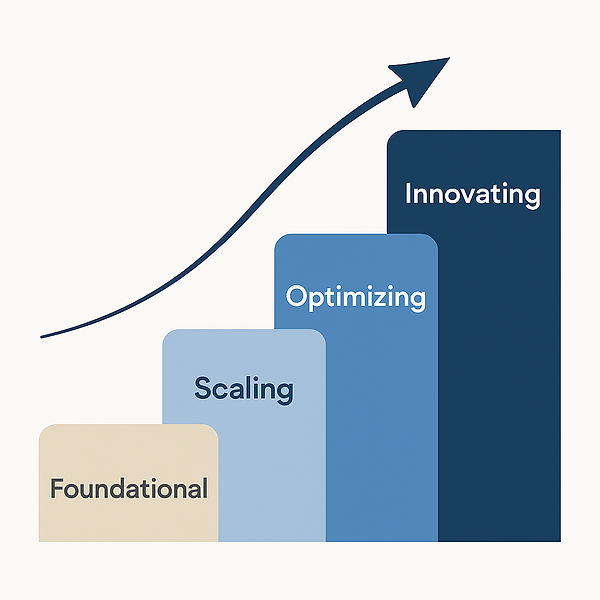Where Are You in Your Digital Product Journey?
Not every organization starts from the same place—and that’s exactly the point.
Whether you're just beginning to deliver services digitally or already managing a portfolio of sophisticated products, the right strategy starts with understanding where you are today. This simple maturity model helps frame your current state and highlight the opportunities that come next. It’s not about checking boxes—it’s about unlocking the most value at every stage of your evolution. I meet you where you are and help you move forward with clarity, confidence, and momentum.

1. Foundational
Definition
You have a basic client-facing website and maybe a few digital tools, but most processes are still manual or offline.
Key Need
Establish core product management practices and introduce digital offerings to streamline operations and set a foundation for growth.
Common Challenges
Limited scalability, lack of actionable data, and under-resourced tech teams.
2. Scaling
Definition
You've moved beyond a basic web presence with portals or simple digital products, but your roadmap, data use, and internal processes still feel ad hoc.
Key Need
Formalize product management roles and workflows. Align teams, define KPIs, and prioritize effectively to enable predictable delivery.
Common Challenges
Resource conflicts, inconsistent user experiences, and growing pains as you juggle multiple products.
3. Optimizing
Definition
You have multiple digital products and established product teams. Agile methods and regular data collection are in place.
Key Need
Refine existing offerings to boost efficiency, increase engagement, and retire what no longer adds value.
Common Challenges
Managing technical debt, proving ROI on ongoing product investments, and surfacing new growth opportunities.
4. Innovating
Definition
You operate at a high level of digital maturity with advanced analytics, dedicated product teams, and a history of successful launches.
Key Need
Stay ahead by continually improving practices, exploring adjacent opportunities, and leveraging new tech for competitive advantage.
Common Challenges
Maintaining innovation velocity, balancing new ventures with optimization, and sustaining cross-functional alignment at scale.